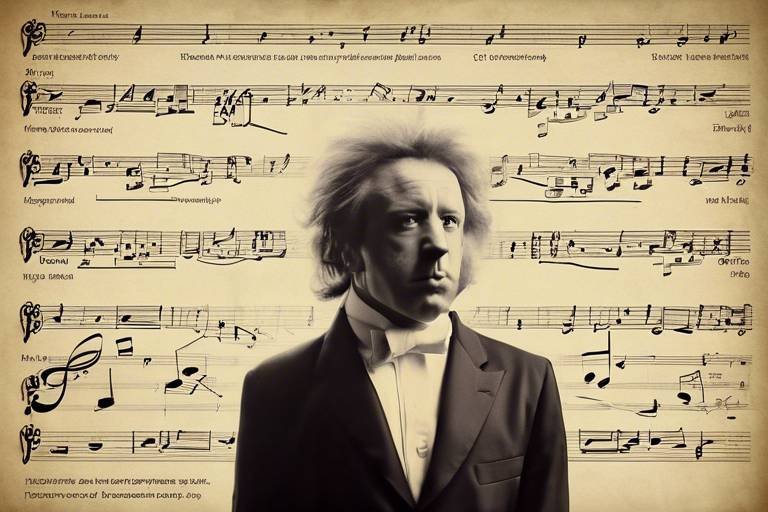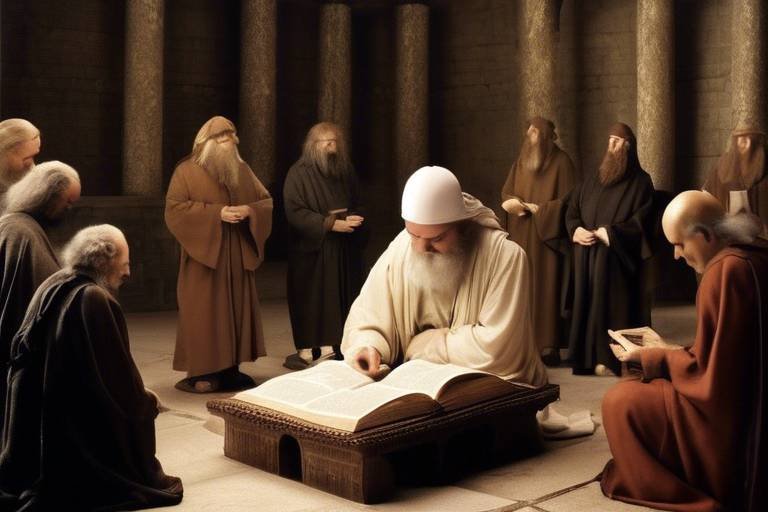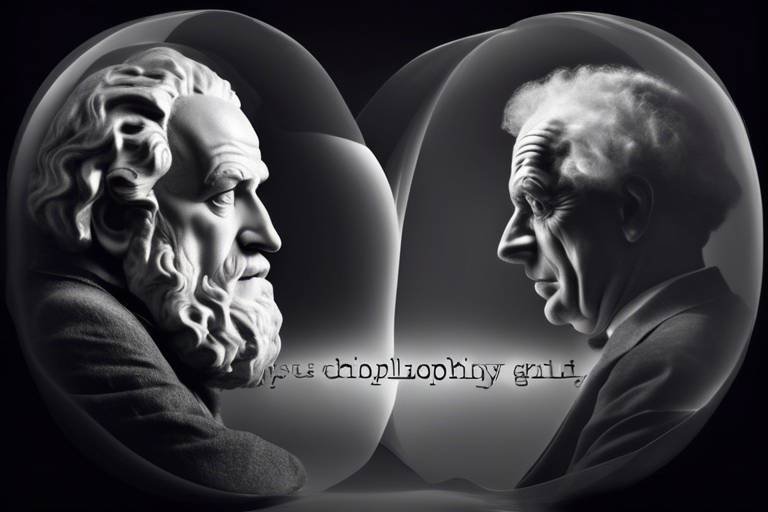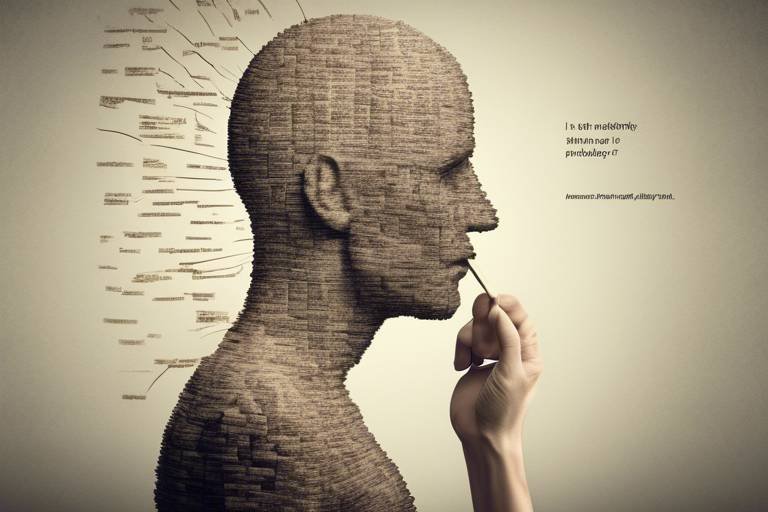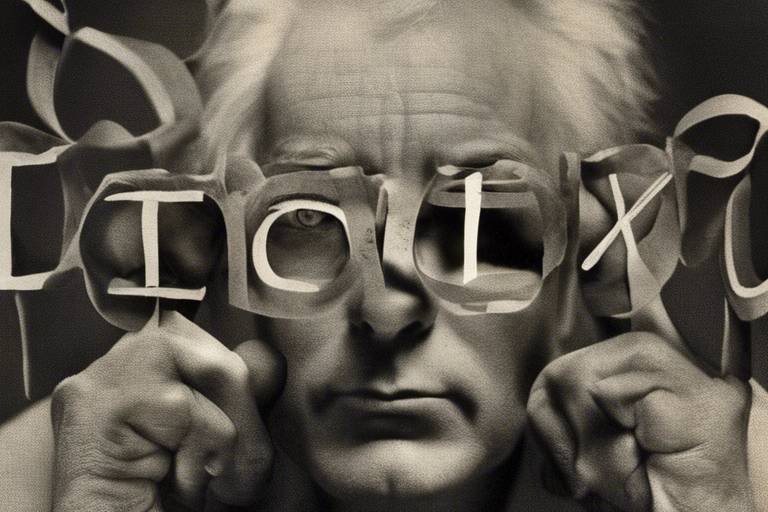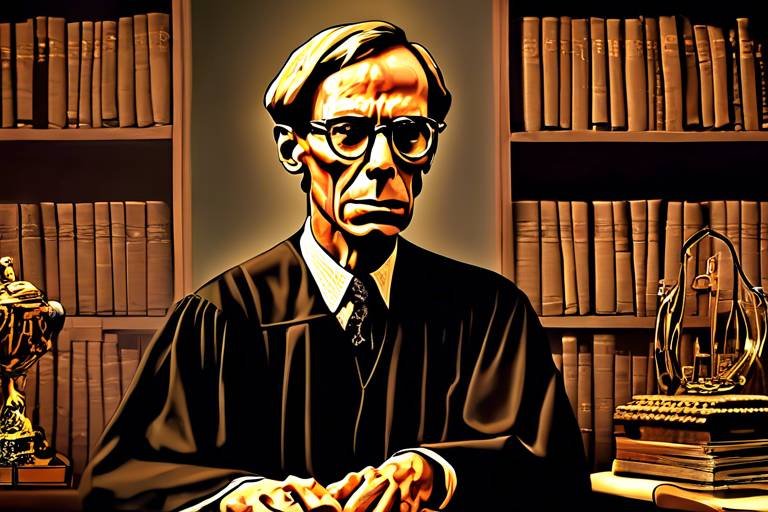Relevance of Deconstruction in Postmodern Philosophy
In the ever-evolving landscape of contemporary thought, deconstruction stands out as a pivotal concept within postmodern philosophy. It serves as a lens through which we can scrutinize the very foundations of our understanding, challenging the norms and assumptions that have long been taken for granted. But what exactly does this mean? At its core, deconstruction invites us to question the established meanings of texts and ideas, revealing the complexities and contradictions that lie beneath the surface. This approach not only reshapes our interpretation of literature but also extends its influence into various fields such as sociology, ethics, and cultural studies.
The relevance of deconstruction today is evident in its ability to foster critical thinking and open dialogue. In a world where information is abundant yet often superficial, the need to engage deeply with ideas has never been more crucial. Deconstruction encourages us to peel back the layers of meaning, much like an onion, exposing the nuanced realities that exist beyond binary oppositions. This method of inquiry not only enriches our understanding but also empowers us to navigate the complexities of modern life with a more informed perspective.
Moreover, deconstruction's impact is not limited to academic circles; it resonates with everyday experiences. For instance, consider how social media often presents information in black-and-white terms, leading to polarized views. Deconstruction challenges us to explore the grey areas, fostering a more inclusive discourse that acknowledges multiple perspectives. This is particularly important in our current climate, where divisive narratives can dominate public conversation. By embracing deconstruction, we can cultivate a more nuanced understanding of the world around us, promoting empathy and collaboration.
As we delve deeper into the various facets of deconstruction, it becomes clear that its relevance extends beyond mere critique. It encourages a transformative approach to knowledge and understanding. The principles of deconstruction can be applied to various disciplines, making it a versatile tool in our intellectual arsenal. Whether we are analyzing a piece of literature, examining societal structures, or contemplating ethical dilemmas, deconstruction provides a framework that challenges us to think critically and creatively.
In conclusion, the significance of deconstruction in postmodern philosophy cannot be overstated. Its ability to challenge traditional interpretations and highlight the fluidity of meaning has profound implications for various fields of study. As we continue to navigate the complexities of modern existence, embracing the principles of deconstruction can lead us to a richer, more inclusive understanding of the world. In the following sections, we will explore the foundational concepts of deconstruction, its key figures, and its impact on literary criticism and social theory.
- What is deconstruction?
Deconstruction is a critical approach that seeks to challenge and reveal the inherent contradictions in texts and ideas. - Who is Jacques Derrida?
Jacques Derrida is a prominent philosopher known for his work on deconstruction and its implications in various fields. - How does deconstruction affect literary criticism?
Deconstruction encourages readers to question established interpretations, leading to new insights and perspectives on literature. - Can deconstruction be applied outside of literature?
Yes, deconstruction is relevant in social theory, ethics, and many other disciplines, providing tools for critical analysis.

Understanding Deconstruction
Deconstruction is not just a fancy term tossed around in academic circles; it’s a transformative lens through which we can view texts, ideas, and even our everyday lives. At its core, deconstruction is a critical approach that challenges the traditional interpretations of texts and concepts, shining a light on the inherent contradictions and assumptions that often lie hidden beneath the surface. Imagine peeling back the layers of an onion—each layer reveals something new and sometimes unexpected. That’s precisely what deconstruction aims to do with language and meaning.
Originating from the work of philosophers like Jacques Derrida, deconstruction invites us to question the very foundations of our understanding. It posits that meaning is not fixed; instead, it is fluid and constantly shifting based on context and interpretation. To illustrate this, think about how the same word can evoke different feelings and ideas depending on who is saying it and in what situation. For instance, the word "freedom" might resonate differently for someone living in a democracy compared to someone in a dictatorship. This fluidity is the crux of deconstruction.
One of the fundamental ideas of deconstruction is that language is inherently unstable. Words can carry multiple meanings, and their significance can change over time. This challenges the notion that we can ever fully grasp the essence of a text or idea. Derrida famously stated, “There is nothing outside the text,” suggesting that our understanding of reality is mediated through language. Thus, when we engage with a text, we must consider not only what is being said but also what is left unsaid—the silences, the gaps, and the contradictions that can reveal deeper truths.
Furthermore, deconstruction critiques binary oppositions—the idea that we can categorize concepts into two opposing groups, such as good/evil, light/dark, or presence/absence. These binaries often oversimplify complex realities and can lead to misunderstandings. By dismantling these dichotomies, deconstruction opens up new avenues for thought. It encourages us to explore the space in between, where meaning can be more nuanced and rich. For example, consider the binary of male/female. By deconstructing this opposition, we can recognize the spectrum of gender identities that exist beyond these two categories.
In essence, understanding deconstruction is about embracing complexity and ambiguity. It’s about recognizing that our interpretations are shaped by our experiences, biases, and cultural contexts. This approach is not only relevant in literary studies but also in fields like philosophy, sociology, and even politics, where questioning established narratives can lead to a more inclusive and diverse understanding of the world. As we navigate through this fragmented reality, deconstruction serves as a valuable tool for critical thinking and deeper comprehension.

Key Figures in Deconstruction
When we think about the landscape of postmodern philosophy, a few names inevitably rise to the surface, and among them, Jacques Derrida stands out as a pivotal figure in the development of deconstruction. Derrida's contributions are not just limited to the realm of philosophy; they extend into literature, cultural studies, and even political theory. His unique approach to texts and meaning has reshaped how we understand language and interpretation, making his work essential for anyone diving into the world of deconstruction.
But Derrida is not alone. Other influential thinkers have also played a significant role in shaping deconstruction's trajectory. For instance, Paul de Man is another key figure whose work in literary theory has provided critical insights into the instability of meaning and the complexities of interpretation. De Man's perspective builds upon Derrida's ideas, emphasizing how texts can never convey a single, fixed meaning. Instead, every reading opens up a new layer of interpretation, revealing the fluidity inherent in language.
Furthermore, we cannot overlook the contributions of Julia Kristeva, whose ideas about intertextuality and the role of the reader in constructing meaning have enriched the discourse surrounding deconstruction. Kristeva's work draws on psychoanalytic theory and feminist thought, offering a nuanced understanding of how texts interact with cultural and social contexts. She challenges readers to recognize their own role in the creation of meaning, thus expanding the implications of deconstruction beyond mere textual analysis.
To illustrate the connections between these thinkers, the following table summarizes their key contributions:
| Thinker | Key Contributions |
|---|---|
| Jacques Derrida | Introduced deconstruction, challenged fixed meanings, emphasized the play of language. |
| Paul de Man | Explored the instability of meaning in texts, focused on rhetorical analysis. |
| Julia Kristeva | Developed the concept of intertextuality, integrated psychoanalysis and feminist theory. |
These thinkers, among others, have collectively shaped the discourse of deconstruction, each bringing their unique perspectives and methodologies to the table. Their works invite us to question not only the texts we engage with but also the broader frameworks of thought that underpin our understanding of reality. So, the next time you pick up a book or engage in a philosophical discussion, consider how these figures have influenced your interpretation and understanding of the world around you.
- What is deconstruction? Deconstruction is a critical approach that seeks to dismantle traditional interpretations of texts, revealing contradictions and assumptions.
- Who is Jacques Derrida? Jacques Derrida is a French philosopher known for developing the concept of deconstruction, which challenges fixed meanings in language.
- How has deconstruction influenced literary criticism? Deconstruction encourages readers to question established interpretations, leading to a more dynamic understanding of literature.
- What role do other thinkers play in deconstruction? Thinkers like Paul de Man and Julia Kristeva expand on Derrida's ideas, bringing new insights into meaning and interpretation.

Derrida's Philosophy
Jacques Derrida, a towering figure in the realm of philosophy, is often celebrated for his revolutionary approach to texts and meaning. His work goes beyond mere literary criticism; it challenges us to reconsider the very foundations of how we understand language and its implications in our lives. At the heart of Derrida's philosophy lies the concept of deconstruction, a method that seeks to uncover the hidden assumptions and contradictions within texts and ideas. This is not just an academic exercise; it's a profound inquiry into the nature of meaning itself.
Derrida's philosophy is encapsulated in several key texts, each contributing to his overarching critique of Western metaphysics. Works like Of Grammatology, Writing and Difference, and Margins of Philosophy explore the intricate relationship between language, meaning, and reality. In these texts, Derrida argues that meaning is not fixed or stable; rather, it is fluid and constantly shifting. This perspective invites us to question the reliability of language as a tool for conveying absolute truths.
One of the most striking aspects of Derrida's thought is his critique of binary oppositions. He posits that much of Western philosophy relies on dichotomies—such as presence/absence, speech/writing, and good/evil—that simplify complex ideas into neat categories. However, Derrida reveals that these binaries are not only limiting but often serve to reinforce power structures and ideologies. By deconstructing these oppositions, he opens up a space for alternative interpretations and a more nuanced understanding of reality. For instance, when we examine the concept of presence, Derrida argues that it is always accompanied by absence, challenging the notion that we can ever fully grasp or represent reality.
Moreover, Derrida's emphasis on textuality further complicates our understanding of meaning. He suggests that texts are not isolated entities but rather part of a larger web of intertextuality, where meanings are shaped by their relationships with other texts. This interconnectedness means that interpretation is inherently subjective, influenced by the reader's context, experiences, and cultural background. As a result, Derrida encourages us to embrace the ambiguity and multiplicity of meanings rather than seeking a single, authoritative interpretation.
In summary, Derrida's philosophy invites us to challenge our assumptions about language, meaning, and knowledge. By deconstructing established norms and exploring the fluidity of textuality, he paves the way for new ways of thinking that embrace complexity and contradiction. This approach not only enriches our understanding of literature but also has profound implications for how we navigate the world around us.
- What is deconstruction? Deconstruction is a critical approach that analyzes texts to reveal inherent contradictions and challenges traditional interpretations.
- Who is Jacques Derrida? Jacques Derrida was a French philosopher known for his work on deconstruction and its implications for language and meaning.
- How does Derrida's philosophy impact literature? Derrida's philosophy encourages readers to question established interpretations and embrace the complexity of texts.
- What are binary oppositions? Binary oppositions are pairs of contrasting terms, such as good/evil or presence/absence, that Derrida critiques for oversimplifying complex ideas.

Textuality and Meaning
Jacques Derrida's exploration of textuality and meaning is nothing short of revolutionary. He argues that meaning is not a fixed entity waiting to be uncovered; rather, it is a fluid and dynamic process that evolves with each reading. Imagine a river, constantly flowing and changing, where the water represents meaning, and the riverbanks symbolize the texts from which we derive understanding. Just as the river's course can shift, so too can our interpretations of a text. This perspective challenges the traditional view that words have stable meanings, suggesting instead that they are influenced by context, culture, and the reader's own experiences.
Derrida introduces the idea of différance, a term that encapsulates the notion that meaning is always deferred. When we read a text, we might think we've grasped its meaning, only to find that another layer of interpretation lies just beyond our reach. This constant deferral creates a rich tapestry of interpretations, where each thread adds depth and complexity. For instance, consider a simple phrase like "freedom." Depending on the cultural, historical, or personal context, its meaning can vary dramatically. This multiplicity is what Derrida seeks to highlight, arguing that the quest for a singular, definitive interpretation is not only futile but also reductive.
Furthermore, Derrida's emphasis on intertextuality reveals how texts are interconnected. Each piece of literature does not exist in a vacuum but rather interacts with countless other texts, ideas, and cultural artifacts. This web of connections influences how we interpret meaning. For example, a contemporary novel might reference classical literature, thereby enriching its narrative and altering our understanding of its themes. This interplay between texts underscores the idea that meaning is not only derived from the text itself but also from the broader cultural and literary context in which it is situated.
To illustrate the impact of Derrida's ideas, consider the following table that summarizes the key aspects of textuality and meaning:
| Concept | Description |
|---|---|
| Différance | The idea that meaning is always deferred and never fully attainable. |
| Intertextuality | The interconnectedness of texts that influences meaning. |
| Fluidity of Meaning | The notion that meanings change based on context and reader interpretation. |
In conclusion, Derrida's approach to textuality and meaning invites us to embrace the complexity of interpretation. It encourages us to be open-minded and flexible in our readings, recognizing that every text can yield a multitude of meanings. This understanding not only enriches our literary experiences but also fosters a deeper appreciation for the nuances of language and communication. So, the next time you pick up a book or engage with a piece of writing, remember that the journey of meaning is as important as the destination.
- What is deconstruction? Deconstruction is a critical approach that seeks to uncover the inherent contradictions and assumptions in texts and ideas.
- Who is Jacques Derrida? Jacques Derrida is a French philosopher known for his work on deconstruction and its implications for language, meaning, and interpretation.
- How does deconstruction impact literary criticism? Deconstruction encourages readers to question established interpretations and embrace multiple meanings within texts.
- What is the significance of intertextuality? Intertextuality highlights the connections between texts, showing how they influence each other and shape our understanding of meaning.

Binary Oppositions
In the realm of deconstruction, the concept of plays a pivotal role in how we understand language and meaning. At its core, a binary opposition is a pair of contrasting terms or concepts, such as light/dark, good/evil, or male/female. These pairs are often seen as fundamental to our understanding of the world. However, deconstruction invites us to interrogate these oppositions, questioning their stability and the hierarchies they create.
Consider the classic example of good vs. evil. Society often positions 'good' as superior and 'evil' as inferior. But what happens when we start to dismantle this binary? By doing so, we uncover the complexities that exist between these extremes. This process reveals that the definitions of 'good' and 'evil' are not fixed; they are influenced by cultural context, personal experience, and societal norms. This fluidity challenges the notion that these terms can be clearly defined or understood in isolation.
Moreover, deconstruction emphasizes that binary oppositions are not merely linguistic constructs but also reflect deeper social and cultural hierarchies. For instance, the male/female dichotomy has historically placed masculinity in a position of power over femininity. By critiquing this binary, we can begin to see how gender roles are constructed and maintained, leading to a more nuanced understanding of gender identity and expression.
Through the lens of deconstruction, we can identify several implications of binary oppositions:
- Revealing Assumptions: By questioning these oppositions, we expose the underlying assumptions that shape our beliefs and values.
- Encouraging Plurality: Breaking down rigid binaries allows for a more inclusive perspective, acknowledging the diversity of human experience.
- Challenging Norms: Deconstruction empowers individuals to challenge societal norms that are often taken for granted.
In essence, by dismantling binary oppositions, deconstruction not only enriches our understanding of language but also encourages a critical examination of the world around us. It opens up a space for dialogue and exploration, where meanings are not fixed but rather fluid and dynamic. This approach fosters a deeper appreciation for the complexities of human thought and experience, urging us to move beyond simplistic categorizations.
Q1: What are binary oppositions?
A1: Binary oppositions are pairs of contrasting ideas or concepts, such as light/dark or good/evil, that are often used to structure our understanding of the world.
Q2: How does deconstruction challenge binary oppositions?
A2: Deconstruction critiques binary oppositions by revealing their inherent contradictions and the hierarchies they create, encouraging a more nuanced understanding of meaning.
Q3: Why are binary oppositions important in philosophy?
A3: They are crucial because they shape our beliefs and values, influencing how we categorize and interpret our experiences in the world.
Q4: Can you provide an example of a binary opposition?
A4: Yes, a common example is the male/female dichotomy, which often places masculinity in a position of power over femininity, affecting societal roles and expectations.

Impact on Literary Criticism
The impact of deconstruction on literary criticism has been nothing short of revolutionary. By challenging traditional interpretations and encouraging a more nuanced reading of texts, deconstruction has opened up a world of possibilities for literary scholars and enthusiasts alike. Imagine walking into a library filled with books that you've read countless times, only to discover that each one holds layers of meaning you hadn't previously considered. That's the magic of deconstruction—it invites us to peel back the layers and explore the hidden complexities within literary works.
One of the most significant contributions of deconstruction to literary criticism is its emphasis on the instability of meaning. Jacques Derrida, the father of deconstruction, argued that words and texts do not have fixed meanings; rather, they are subject to interpretation and reinterpretation. This notion has led critics to adopt a more flexible approach when analyzing literature. Instead of seeking a singular meaning or authorial intent, deconstruction encourages a dialogue between the text and the reader, allowing for multiple interpretations to coexist. It's like a conversation where everyone has a voice, and each perspective enriches the overall understanding of the work.
Moreover, deconstruction has shifted the focus from the author to the reader, emphasizing the role of the audience in creating meaning. This reader-response theory has transformed how we engage with texts, making the act of reading a collaborative experience. When we approach a literary work with a deconstructive lens, we become active participants in the meaning-making process. We start to ask questions like, "What assumptions am I bringing to this text?" or "How does my context shape my understanding?" This self-reflective approach not only deepens our appreciation of literature but also fosters critical thinking skills that are essential in today’s world.
Another area where deconstruction has made a significant impact is in the critique of established literary canons. Traditionally, certain texts and authors have been elevated to a status of unquestionable importance. However, deconstruction challenges these hierarchies, urging us to consider marginalized voices and alternative narratives. By questioning who gets to define "great literature," deconstruction paves the way for a more inclusive literary landscape. This shift is crucial, as it allows for a broader understanding of culture and society, reflecting the diverse experiences and perspectives that shape our world.
In practical terms, the influence of deconstruction can be seen in various literary movements, such as postcolonial literature and feminist criticism. These movements often employ deconstructive strategies to dismantle dominant narratives and highlight the complexities of identity, power, and representation. For instance, a feminist reading of a classic novel might focus on the ways in which gender roles are constructed and deconstructed within the text, revealing the societal norms that inform both the narrative and the reader's interpretation. This approach not only enriches our understanding of the literature itself but also encourages us to critically engage with the world around us.
In summary, the impact of deconstruction on literary criticism is profound and far-reaching. It has transformed our understanding of meaning, shifted the focus from author to reader, and challenged established literary hierarchies. As we continue to explore literature through a deconstructive lens, we not only enhance our appreciation of texts but also cultivate a more critical and inclusive approach to storytelling. So the next time you pick up a book, remember that each page is a gateway to endless interpretations—are you ready to explore?

Deconstruction in Social Theory
Deconstruction, while often associated with literary criticism, extends its reach into the realm of social theory, offering a profound critique of established power structures and ideologies. At its core, deconstruction invites us to question the very foundations upon which societal norms and beliefs are built. By doing so, it unveils the complexities and contradictions that lie beneath the surface of our social constructs. Imagine peeling back the layers of an onion; each layer reveals not only the core but also the imperfections and inconsistencies that may have gone unnoticed. This process of unearthing invites a deeper understanding of the world we inhabit.
One of the most significant contributions of deconstruction to social theory is its ability to challenge the dominant narratives that claim to represent universal truths. These overarching narratives, or metanarratives, often simplify the vast complexities of human experience into tidy packages that can be easily consumed. However, deconstruction argues that these narratives are inherently flawed, as they tend to marginalize alternative perspectives and voices. By questioning these grand narratives, deconstruction fosters a more pluralistic approach to knowledge, encouraging us to embrace diversity in thought and experience.
Consider the implications of this critique on our understanding of history, culture, and identity. For instance, traditional historical narratives often prioritize certain events or figures while neglecting others, leading to a skewed perception of reality. Deconstruction prompts us to ask critical questions such as:
- Whose voices are being heard, and whose are being silenced?
- What assumptions underpin the narratives we accept as truth?
- How do these narratives shape our understanding of ourselves and others?
By grappling with these questions, we can begin to recognize the limitations of our own perspectives and the importance of inclusivity in our social discourse. In this way, deconstruction serves as a catalyst for social change, urging us to rethink the structures of power that dictate our lives.
Moreover, deconstruction also has significant implications for ethics and responsibility in a fragmented world. As we come to understand that our beliefs and values are often constructed through language and cultural narratives, we are compelled to reconsider our moral obligations to one another. The very act of deconstructing our assumptions can lead to a heightened sense of awareness regarding the impact of our actions on others. In a society that often prioritizes individualism, deconstruction encourages a more interconnected approach to ethics, urging us to recognize our shared humanity.
In conclusion, deconstruction in social theory is not merely an academic exercise; it is a vital tool for understanding and navigating the complexities of modern life. By challenging dominant narratives and fostering a more inclusive dialogue, deconstruction empowers us to engage with the world in a more thoughtful and responsible manner. As we continue to explore the implications of deconstruction, we must remain open to the myriad possibilities it presents for reimagining our social realities.
What is deconstruction in social theory?
Deconstruction in social theory is a critical approach that challenges established power structures and ideologies, questioning dominant narratives and fostering a more inclusive understanding of knowledge and experience.
How does deconstruction impact our understanding of history?
Deconstruction reveals the limitations of traditional historical narratives, encouraging us to consider whose voices are represented and whose are marginalized, thus promoting a more pluralistic view of history.
What ethical questions does deconstruction raise?
Deconstruction prompts us to rethink our moral responsibilities in a fragmented world, emphasizing interconnectedness and the impact of our actions on others.

Critique of Metanarratives
In the realm of postmodern philosophy, the stands as a cornerstone of deconstructive thought. Metanarratives, or grand narratives, are overarching stories or theories that attempt to explain historical events, cultural phenomena, and social structures in a universal manner. Think of them as the big, sweeping tales that claim to hold the key to understanding the world. However, as Jacques Derrida and other deconstructionists argue, these narratives often oversimplify complex realities and ignore the rich tapestry of individual experiences.
By challenging these grand narratives, deconstruction invites us to question the very foundations upon which they are built. Are these narratives truly universal, or do they reflect the perspectives of those in power? For instance, consider how historical accounts often glorify certain figures while marginalizing others. This selective storytelling can create a skewed understanding of events, leading to a society that values some voices over others. Deconstruction prompts us to peel back the layers of these narratives, revealing the hidden biases and assumptions that lie beneath the surface.
The implications of this critique are profound. It encourages a more pluralistic approach to knowledge, one that embraces diversity and recognizes that multiple truths can coexist. Instead of adhering to a single narrative, we are urged to explore a multitude of perspectives. This not only enriches our understanding but also fosters a culture of inclusivity. By acknowledging the validity of different experiences, we create space for dialogue and understanding among diverse groups.
Consider the impact of deconstructing metanarratives in various fields, such as history, literature, and social sciences. In history, for example, a deconstructive approach would challenge the dominant narratives that often celebrate conquest while ignoring the voices of the conquered. In literature, it would encourage readers to see beyond the author's intended meaning, exploring the myriad interpretations that arise from individual experiences. This shift in perspective can lead to a more nuanced understanding of texts and their implications.
Moreover, the critique of metanarratives invites us to reflect on our own beliefs and assumptions. It asks us to consider the narratives we hold dear and to question their origins. Are they based on fact, or are they shaped by cultural, social, or political influences? This self-reflective process is essential for personal growth and for fostering a more empathetic society.
In summary, the critique of metanarratives in deconstruction not only challenges the dominant stories that shape our understanding of the world but also encourages a more inclusive and pluralistic approach to knowledge. By questioning these grand narratives, we open ourselves up to a wealth of perspectives and experiences, enriching our understanding of both ourselves and the world around us.
- What are metanarratives? Metanarratives are grand narratives or overarching stories that attempt to explain historical events and cultural phenomena universally.
- Why is the critique of metanarratives important? It challenges dominant narratives that may oversimplify complex realities and encourages a more pluralistic understanding of knowledge.
- How does deconstruction affect our understanding of literature? It allows for multiple interpretations of texts, enriching our understanding and appreciation of literature.
- Can deconstruction be applied to social issues? Yes, it can help challenge power structures and ideologies, fostering a more inclusive society.

Ethics and Responsibility
The exploration of ethics and responsibility within the framework of deconstruction is both profound and necessary, especially in a world that often feels fragmented and chaotic. Deconstruction invites us to reconsider the foundations of our moral beliefs and the systems that uphold them. It challenges us to ask: What does it mean to be responsible in a society where truths are not absolute but rather constructed and deconstructed? This inquiry is not merely academic; it has real-world implications for how we interact with one another and the structures in which we live.
At its core, deconstruction reveals that our ethical frameworks are often built upon unstable foundations. For instance, traditional moral systems may rely on universal principles that claim to apply to all, yet deconstruction encourages us to question these metanarratives. Are these principles genuinely universal, or do they reflect the biases and assumptions of specific cultural contexts? By dismantling these overarching narratives, we can foster a more inclusive approach to ethics that acknowledges the diversity of human experience.
Moreover, deconstruction emphasizes the importance of context in ethical decision-making. It reminds us that actions cannot be judged solely by rigid rules; instead, they must be understood within the complexities of individual circumstances. This leads to a more nuanced understanding of responsibility, where one’s actions are not merely right or wrong but are influenced by a myriad of factors, including social, cultural, and historical contexts. Consequently, as we navigate our moral landscapes, we must remain vigilant and open to the fluidity of ethical considerations.
In practical terms, this deconstructive approach to ethics raises vital questions about our responsibilities towards others. For example, in a globalized world, how do we respond to injustices that transcend borders? What obligations do we have to those who are suffering in distant lands? Deconstruction encourages us to confront these questions head-on, pushing us to expand our circles of empathy and responsibility beyond our immediate communities.
To illustrate the impact of deconstruction on ethics, consider the following table that outlines key ethical questions arising from a deconstructive lens:
| Traditional Ethical Framework | Deconstructive Perspective |
|---|---|
| Universal moral principles apply to all. | Ethical truths are context-dependent and subjective. |
| Actions are judged as right or wrong. | Actions must be understood within their specific contexts. |
| Responsibility is clearly defined. | Responsibility is complex and multifaceted. |
| Focus on individual actions. | Consideration of systemic factors influencing actions. |
Ultimately, the deconstructive approach to ethics and responsibility invites us to engage in a continuous dialogue about our moral beliefs. It encourages us to remain open to the possibility that our understanding of ethics can evolve as we confront new challenges and experiences. This fluidity is not a weakness; rather, it is a strength that can lead to more compassionate and equitable societies.
- What is deconstruction in ethics? Deconstruction in ethics involves questioning and analyzing traditional moral frameworks to reveal their assumptions and biases, leading to a more nuanced understanding of responsibility.
- How does deconstruction challenge universal moral principles? Deconstruction posits that moral principles are often culturally and contextually bound, rather than universally applicable.
- Can deconstruction inform social justice movements? Yes, by encouraging a critical examination of power structures and metanarratives, deconstruction can empower social justice movements to advocate for more inclusive and equitable practices.
Frequently Asked Questions
- What is deconstruction in postmodern philosophy?
Deconstruction is a critical approach that examines texts and ideas by revealing their inherent contradictions and assumptions. It challenges traditional interpretations, encouraging a deeper understanding of meaning and context within various disciplines.
- Who are the key figures in deconstruction?
Prominent thinkers such as Jacques Derrida have played a significant role in shaping the discourse around deconstruction. Their contributions have influenced not only philosophy but also literary criticism and social theory, impacting how we understand texts and cultural narratives.
- How does Derrida's philosophy relate to textuality and meaning?
Derrida's philosophy emphasizes the fluidity of meaning in texts, suggesting that interpretation is never fixed. This perspective disrupts conventional views of language, highlighting that meaning can shift based on context, reader perspective, and cultural influences.
- What are binary oppositions, and why are they important in deconstruction?
Binary oppositions are pairs of contrasting concepts, such as good/evil or light/dark. Deconstruction critiques these binaries, revealing their limitations and encouraging a more nuanced understanding of complex ideas, which can lead to new avenues for thought and interpretation.
- How has deconstruction impacted literary criticism?
Deconstruction has transformed literary theory by prompting readers to question established interpretations of texts. It encourages a more active engagement with literature, allowing for multiple readings and interpretations, which enriches the understanding of literary works.
- What role does deconstruction play in social theory?
In social theory, deconstruction challenges existing power structures and ideologies, fostering a critical examination of societal norms. It helps to understand the complexities of culture and identity, promoting a more inclusive and pluralistic view of knowledge and experience.
- What is the significance of critiquing metanarratives in deconstruction?
Critiquing metanarratives—overarching narratives that claim universal truths—allows for a more pluralistic understanding of knowledge. This critique encourages diverse perspectives and recognizes the validity of individual experiences, leading to a richer dialogue about truth and meaning.
- How does deconstruction address ethics and responsibility?
Deconstruction raises important ethical questions by examining the assumptions underlying moral actions in a fragmented world. It encourages individuals to reflect on their responsibilities and the complexities of ethical decision-making in diverse contexts.







